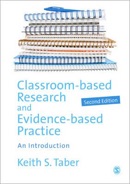Educational Research Methods

A site to support teaching and learning...
The following text is part of a vignette taken from a master’s research thesis (Taber, 1989).
This is a personal site of Keith S. Taber to support teaching of educational research methods.
(Dr Keith Taber is Professor of Science Education at the University of Cambridge.)
2017
Gill: A vignette
(The "typical" female pupil's experience of physics at the enquiry school, in comparison to a "typical" male peer.)
A level study
Gill and Barry have a fair chance of staying on to take A levels in the sixth form as about one third of the boys and girls at the school do so. As female and male A level students respectively, Gill and Barry are likely to have a similar range of G.C.S.E. grades on entry to the sixth form and Gill is just as likely as Barry to take science subjects on beyond G.C.S.E. level where she has achieved good passes. In selecting A level subjects Gill is likely to consider enjoyment and interest as more important factors than Barry will; whilst Barry is more likely to choose subject which support each other, and is more likely to make his selection with specific career requirements in mind.
Although Gill may have had some career aspirations at eleven, it is possible she may still not be sure what she wants to do in the upper-sixth. If she has got definite ideas about possible careers these may include those which require physics as a pre-requisite - for example engineering, pharmacy, opthalmics or physiotherapy. Such ideas may well have been initiated by some specific contact with a professional role model, through an initiative such as WISE, or through family connections.
Comment on the ethics of this type of research writing

